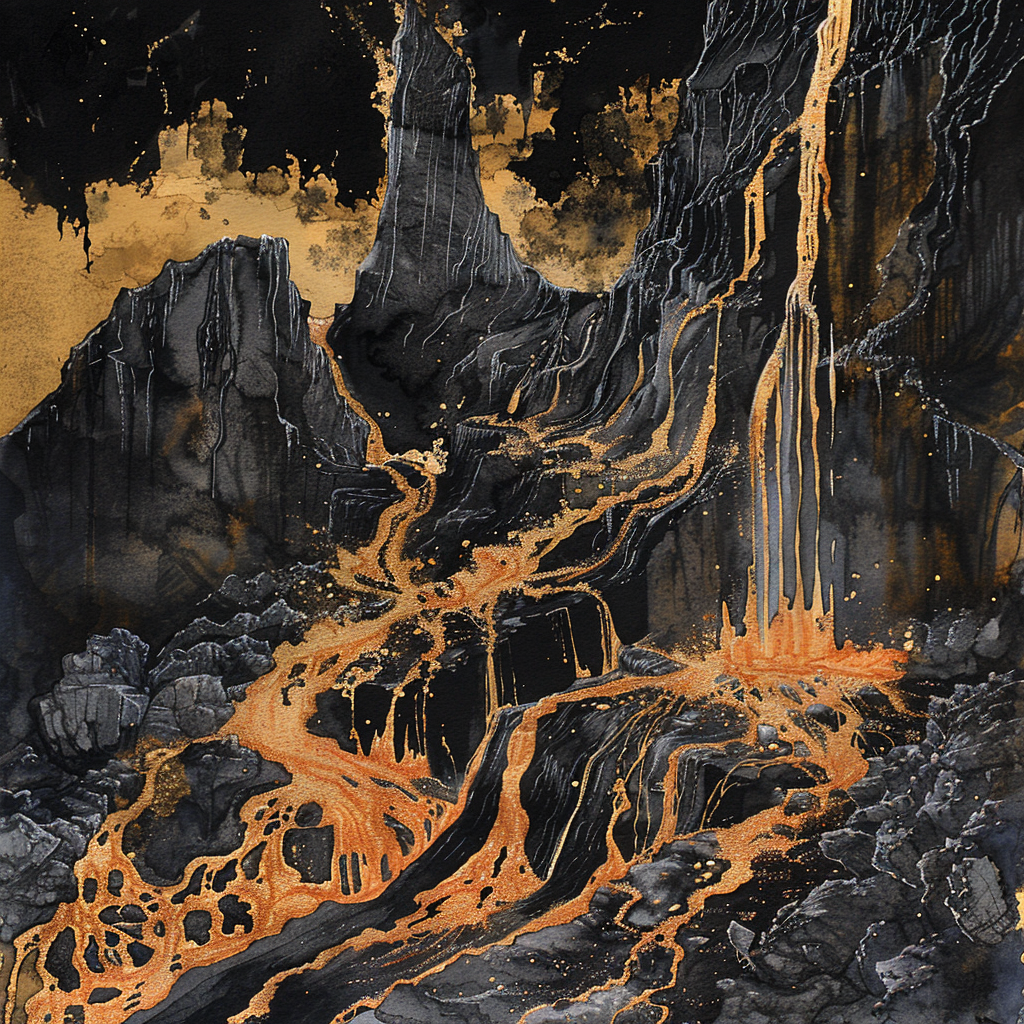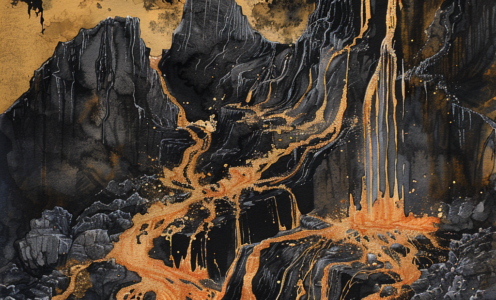[ Gehenna ] [ Khalas | Chamada | Mungoth | Krangath ]
Gehenna
The Fourfold Furnaces, the Bleak Eternity, the Fires of Perdition
Tear-falling pity dwells not in this place
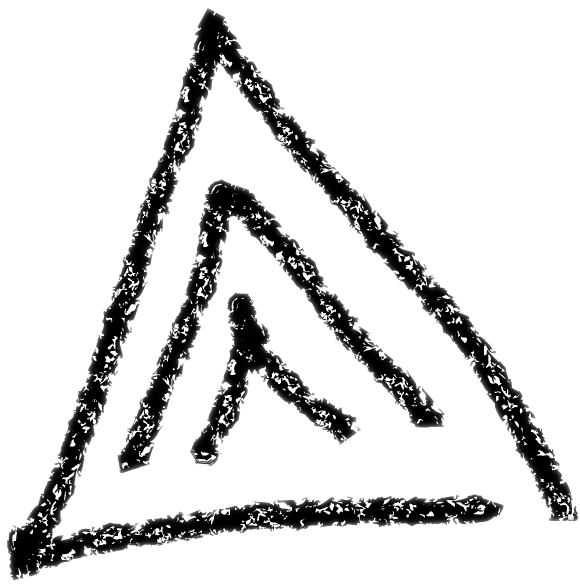
Ah, Gehenna! The Fourfold Furnace, where ambition burns brighter than any molten river and ruthlessness is the air you breathe. Here’s the lowdown for any planewalker barmy—or unlucky—enough to wander into this infernal place.
Gehenna floats within a vast black void, a quartet of colossal volcanic mountains stretching infinitely wide but finite in height. The peaks are steep and unforgiving, with no flat terrain save for the precarious ledges carved out by desperate souls. Each mountain is a hostile environment where the ground itself seems to resent any attempt to rest upon it, for it is constantly shifting, erupting or crumbling. The plane’s layers—Khalas, Chamada, Mungoth, and Krangath—each have their own unique flavour of torment, from boiling magma to freezing desolation.
Beyond the mountains, you’ll find floating earthbergs—remnants of ancient lands. Some drift closer to the mountains, others float aimlessly, and some are pulled into the void. These islands of stability are rare and often fiercely guarded.
Philosophical Themes
Gehenna epitomises ambition, parsimony, and cutthroat competition. It’s a realm where every action is a calculated move in the game of survival and dominance. The inhabitants, whether yugoloths, petitioners or any other poor sods, live by the creed that trust is a weakness and betrayal is the norm. Every relationship is a means to an end, every alliance temporary. The constant climb up the treacherous slopes symbolises the endless struggle for power and resources, with each climber ready to push others down to secure their own position. It’s a dog-eat-dog world where generosity is non-existent unless it serves a strategic purpose.
Fiends of Gehenna
The yugoloth are the dominant force in Gehenna. They’re cunning and ruthless, embodying the very spirit of the Fourfold Furnaces. Interaction with them is perilous at best; they’re always plotting, always scheming. Betrayal is their bread and butter, and they relish the spiritual and physical downfall of others.
However. the ‘loths aren’t the only fiendish race who call Gehenna home. The divs, corruptions of twisted genies, also lurk here. Less numerous than the yugoloths, but every bit as spiteful, the divs are more interested in tearing down mortals and genies than worrying about the Blood War or gathering souls.
The yugoloth have a complex relationship with the divs. Both seek power and revel in wickedness, but their methods and ultimate goals often put them at odds. The yugoloth are mercenaries and manipulators, masters of cunning and contract, while the divs are agents of pure destruction, driven by Ahriman’s desire for obliteration.
In the layers where their interests intersect, the yugoloth and divs might form uneasy alliances, using each other to further their own ends. For instance, yugoloth might hire divs for particularly destructive tasks, knowing their insatiable hatred of mortals can potentially be directed towards a common enemy. However, these agreements are always temporary and fraught with tension, as neither side trusts the other, and both are quick to turn on their erstwhile allies if it serves their purposes.
Petitioners of Gehenna
Petitioners in Gehenna are souls that have been twisted by their sins and ambitions, then bound to the harsh slopes of this infernal plane. These poor sods are trapped in a perpetual state of suffering and toil, their forms often contorted and grotesque, reflecting the moral corruption that brought them here. Mere shadows of their former selves, they’re driven by a primal urge to survive and dominate.
So, what does it take to deserve an afterlife up in Gehenna? If you’re driven by ambition, greed, and a ruthless disregard for others in life; if you’re a betrayer, swindler, or climbed to power by stepping on the backs of the weak; if your actions were marked by a relentless pursuit of self-interest, at the expense of morality and compassion—then you’ll probably end up here in Gehenna, with its ethos of survival at any cost, a fitting end for such souls.
Petitioners in Gehenna are subject to the plane’s unforgiving landscape and its inhabitants’ cruelty. They engage in a ceaseless climb up the mountains, scrabbling for a foothold, always wary of betrayal from their fellow sufferers. They might serve more powerful fiends, often becoming slaves in the numerous mining operations scattered across the plane.
Wise Words for Planewalkers
So, you think you’re blood enough to brave Gehenna? First off, don’t trust anyone. Not your fellow planewalkers, not the yugoloths, and certainly not the terrain. Keep your wits about you and always have a backup plan for when—not if—things go downhill. Be prepared for extreme conditions: Bring gear for both scorching heat and freezing cold. And remember, here in Gehenna, the high ground is not just a tactical advantage, it’s a necessity. Keep climbing, keep pushing, because staying still is the same as falling behind.
In short, Gehenna is a pitiless plane of endless ambition and relentless peril. It’s where the strong devour the weak, and the only law is that of the ruthless climb. Venture here only if you’ve got the grit, the guile, and the gumption to survive—and even then, maybe think twice.

Khalas — Layer the First
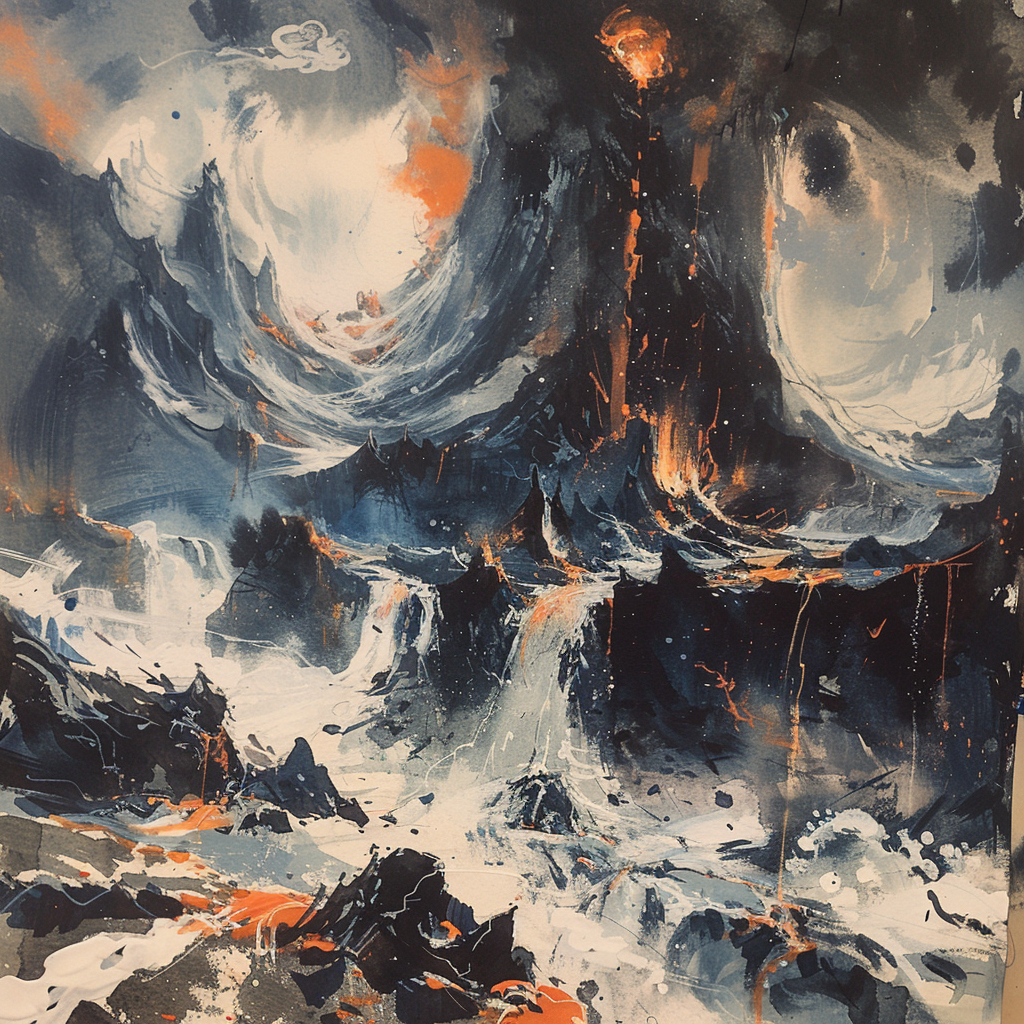
The first layer is also called the Gentle Land. Don’t let the name fool you. The over-worked word gentle here refers to the deceptive calm before the inevitable cave-in, torrent of raging water, rockfall, mudslide, magma flow, or div attack. The mountain slopes are treacherous at best, and the caverns in Khalas collapse regularly, making any semblance of stability a fleeting illusion. Skirmishes in the Blood War frequently spill into Khalas as well, completing the triple threat. On Khalas, you only have to worry about the locals, the invaders and the plane itself trying to kill you.
Find more chant on Khalas here…
Chamada — Layer the Second
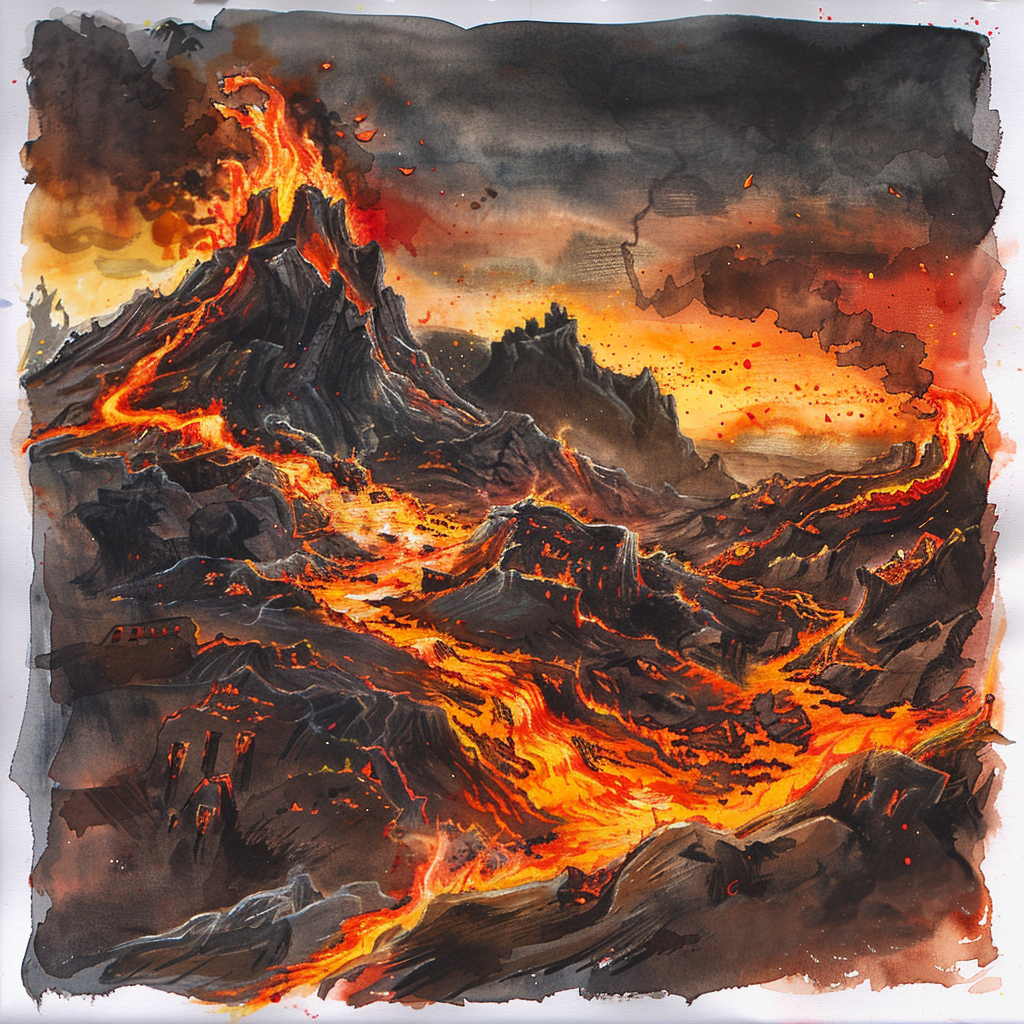
Dubbed the Raging Furnace, Chamada is like some barmy power moulded the Plane of Magma into a mountain, set it on fire, and then sold the most dangerous creatures in the multiverse property there. This is a molten hellscape where the floor quite literally is lava, more often than not. It’s even more deadly underground—there are stiflingly hot tunnels, sure, but without warning a cavern can fill with boiling rock within minutes. Only the foolhardy venture here, seeking passage to Mungoth or hidden treasures within the magma bubbles.
Find more chant on Chamada here…
Mungoth — Layer the Third
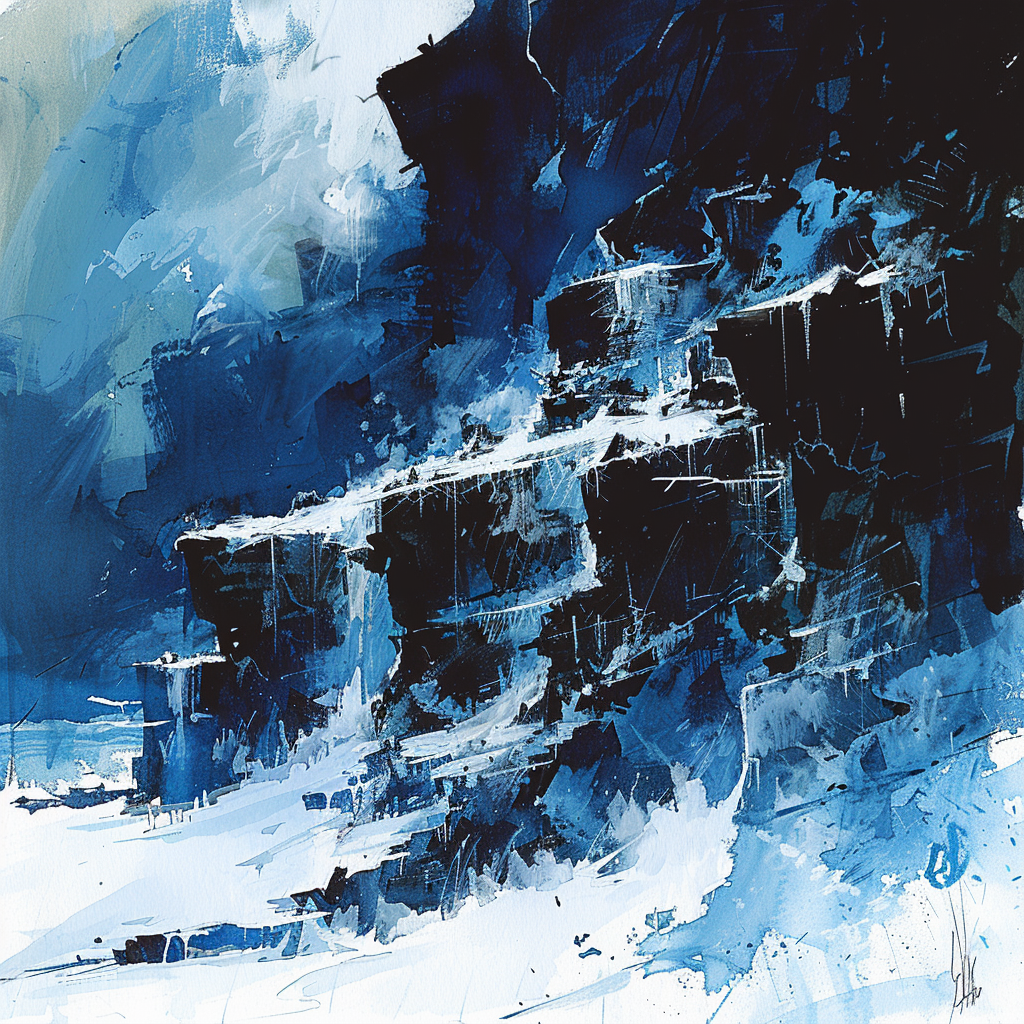
The Burning Ice, or the Crackling Furnace. Mungoth is a paradox of burning cold, with frozen slopes slight with ice and acidic snow that falls continuously from the dark sky. Don’t assume you’re safe from the magma just because it’s cold here though, for the slopes can erupt abruptly, with lava, mudslides or scalding steam. The caverns here are the most habitable part of the layer—which makes them hotly contested. It’s a place where fire and ice intermingle, creating a perilous environment that’s only made worse by the natives.
Find more chant on Mungoth here… coming soon
Krangath — Layer the Fourth
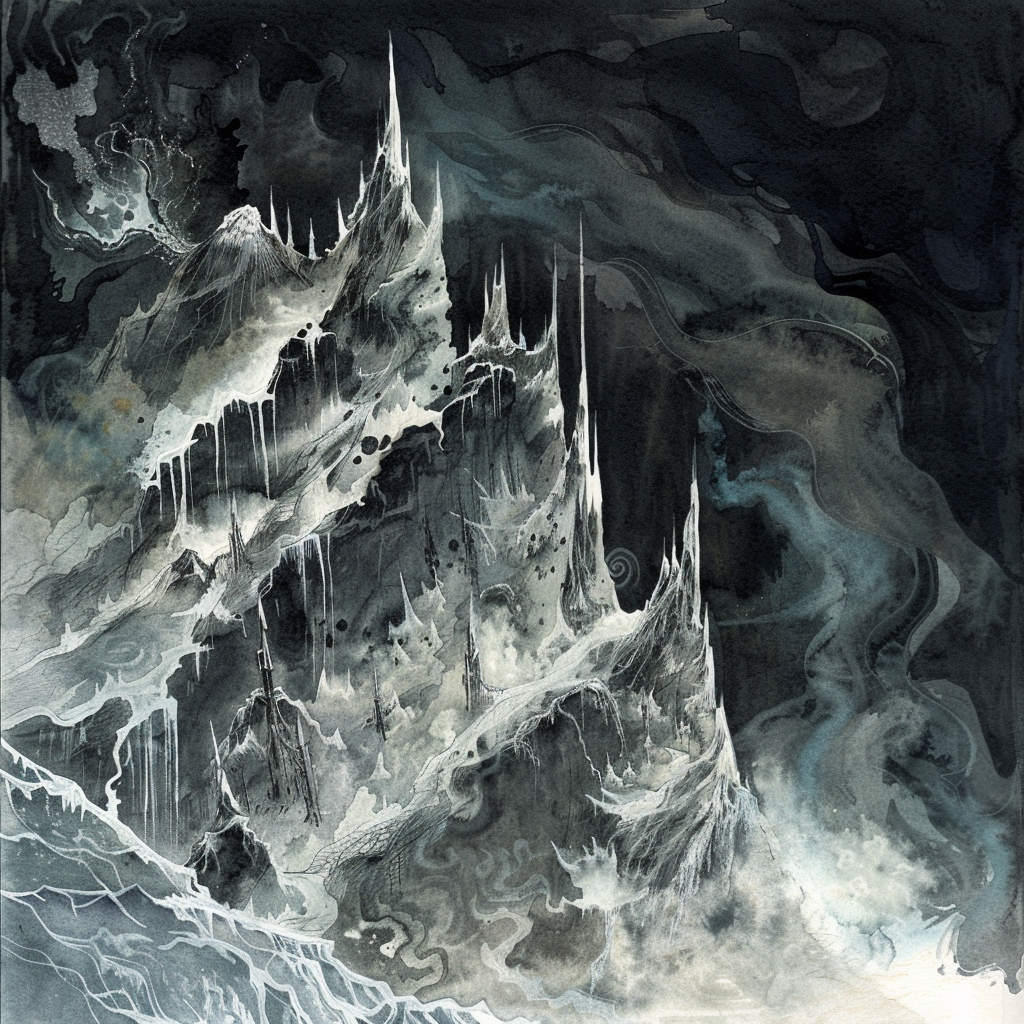
The Dead Furnace. This is the cold, dead heart of Gehenna. Dark and lifeless, it offers no solace, only the bleak promise of endless night and bitter cold. Gripped by eternal night and deathly cold, even the volcano has given up here. The enormous caverns below the surface as almost as cold, but they are not empty. Krangath is home to undead hordes, liches seeking absolute solitude, or powers who prefer to keep their activities secret.
Find more chant on Krangath here… coming soon
More details to follow!
Source: Jon Winter-Holt, mimir.net
Canonical References: See also the excellent Planes of Conflict boxed set for more details on Gehenna. Gehenna (or Gehinnom) is a real-world location, a valley not far from Jerusalem. In the Bible, the book of Jeremiah claims children were sacrificed here to a god named Moloch, and Jeremiah cursed the valley. The name Gehinnom was then associated with a place of divine punishment where the wicked were sent to atone for their sins. “Tear-falling pity dwells not in this place [eye]” is a play on a line from Shakespeare’s Richard III.
